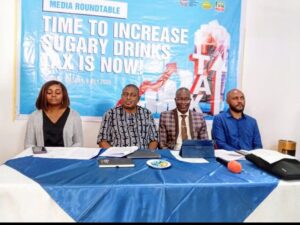

By Rafiyat Sadiq in Abuja.

The Corporate Accountability and Public Participation Africa (CAPPA) has urged the Federal Government to increase the sugar-sweetened beverages (SSB) tax from ₦10 to ₦130 per litre, describing the current rate as grossly inadequate to address Nigeria’s growing public health crisis.
Speaking during a media roundtable in Abuja on Tuesday, CAPPA’s Executive Director, Akinbode Oluwafemi, said the rising consumption of sugary drinks is contributing significantly to the surge in non-communicable diseases (NCDs) such as diabetes, hypertension, stroke, and heart failure, conditions that were once rare but are now widespread across all demographics.
Oluwafemi criticized the ₦10 per litre tax introduced in 2021 as merely symbolic, pointing out that it translates to just ₦3.33 on a 33cl bottle which he said is far too low to deter consumption.
He argued that a meaningful tax adjustment to ₦130 per litre would align with international benchmarks, which typically aim to increase sugary drink prices by 20–50% as a deterrent.
“We are dealing with a silent epidemic,” he warned. “These drinks are killing Nigerians quietly, cheaply, and daily. We can no longer afford to sip our way into catastrophe.”
He stressed that a higher tax would serve as a vital policy tool to curb excessive intake, protect public health, and ease pressure on the healthcare system. Without urgent intervention, he added, the economic and human toll of NCDs will continue to rise.
According to the World Health Organization, NCDs now account for one in every three deaths in Nigeria. Oluwafemi further cited data showing the country loses more than ₦1.9 trillion annually to diet-related illnesses, with many families forced to sell property to cover hospital bills for preventable conditions.
He also raised concerns about the influx of unregulated sugary and energy drinks into the Nigerian market, revealing that some imported products showcased at the 2025 Food and Beverage West Africa exhibition lacked proper labels and nutritional information.
Oluwafemi further called for stronger regulatory oversight and fiscal policies to protect Nigerians from what he termed “unregulated poison infiltration.”
He further alleged that beverage companies and their allies were pushing back against health policies using misleading data and economic threats.
Oluwafemi dismissed claims that SSB taxes would result in job losses, citing countries such as Mexico, the UK, and South Africa where similar taxes were implemented without negative employment impacts.
Oluwafemi further urging President Bola Ahmed Tinubu to fulfil his campaign promise of using tax measures to protect public health. “This is not punishment. It’s protection,” he said.
A Professor of public health promotion and nutrition education, University of illorin,Professor Olukunmi Lanre Olaitan also spoke at the event and described SSBs as a “silent killer,” adding that they have become addictive for children and damaging to both physical and mental health.
“Obesity, infertility, poor metabolism, and mood changes are all tied to excessive sugar intake,” he said.
One of the speaker, a global health researcher, Dr. Joseph Ekiyor also raised concerns over the high sugar content in many sugary drinks sold in Nigeria, noting that most contain over 50 grams of sugar —twice the recommended daily limit for women and exceeding that for men. He warned that frequent spikes in blood sugar levels caused by these drinks are major contributors to diabetes, heart disease, and other non-communicable diseases.
Ekiyor lamented the poor access to affordable healthcare in Nigeria, noting that diabetes medication costs about ₦100,000 monthly, while dialysis can cost up to ₦500,000, figures he said is far above the national minimum wage of ₦70,000.
Also speaking, Joy Amafah-Isaac, the In-Country Coordinator for the Food Policy Programme at the Global Health Advocacy Incubator (GHAI), exposed industry efforts to weaken SSB tax policies through litigation and misinformation. She referenced multiple countries where the beverage industry opposed taxes by claiming economic risks that were later proven unfounded.
She cited Mexico, Colombia, and the UK among others as examples where SSB taxes were upheld and public health improved.
“The industry’s goal is to protect profits, not public health,” she said.
CAPPA urged the federal government to take the following steps: raise the SSB tax to ₦130/litre, earmark revenue for public health and nutrition programmes, mandate front-of-pack nutrition labelling, ensure transparency through annual revenue disclosures by Customs and FIRS, and curb corporate lobbying. They also called for investment in sustainable, healthy food systems
The organization also criticised a platform named Think Business Africa for publishing content they described as misleading and aimed at undermining evidence-based health policy.
“These false arguments are recycled to defend profit margins at the expense of Nigerian lives,” Oluwafemi said.
Edited by Dada Ahmed.


